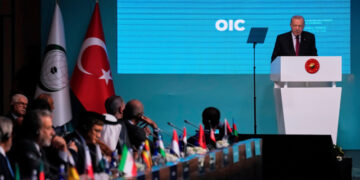Turkey’s efforts to advance OIC resolutions favoring its stance on the Cyprus conflict and the so-called “Turkish” minority in Thrace, as well as the “Turkish” community in the Dodecanese, met with opposition from several key Arab nations—Egypt, Iraq, Saudi Arabia, Kuwait, Lebanon, and Bahrain—during the recent Organization meeting in Istanbul, which was attended by T. Erdoğan and H. Fidan.
As highlighted in the OIC resolutions, Egypt and Bahrain expressed concerns regarding paragraph 24 of the Istanbul Declaration, which pertains to Turkish Cypriots, and paragraph 25, which discusses the “Turkish” Muslim minority in Western Thrace and the Muslim population in the Dodecanese of Greece.
Paragraph 24 states:
“We support the aspirations of the Muslim Turkish Cypriots to secure their inherent rights and stress the importance of a negotiated, fair, just, and sustainable resolution to the Cyprus issue, as well as the necessity of establishing connections with the Muslim Turkish Cypriots to end the unjust isolation they face.”
Paragraph 25 addresses the Muslim minority in Thrace and those in the Dodecanese, asserting:
“We reaffirm our support for the Turkish Muslim minority in Western Thrace and the Turkish Muslim population in the Dodecanese in Greece, advocating for their full enjoyment of fundamental rights and freedoms and emphasizing that their religious and cultural rights must be fully respected.”
However, Turkey’s initiative to have the OIC adopt resolutions regarding Cyprus and the “Status of the Turkish Muslim Minority in Western Thrace and the Muslim population in the Dodecanese” was met with official reservations from Egypt, Iraq, Saudi Arabia, Kuwait, Lebanon, and Bahrain. These nations expressed concerns regarding Resolution No. 3/51, which portrays a deceptive and negative image of Greece regarding the Muslim minority and calls on Greece to:
- Ensure full respect for human rights, including religious freedoms, for all Muslims in the country,
- Take necessary measures to protect the rights, freedoms, and identity of the Turkish Muslim minority in line with international and bilateral agreements,
- Recognize the elected Muftis of Xanthi and Komotini as official Muftis,
- Question the appointment of 240 imams/religious instructors,
- Implement European Court of Human Rights (ECHR) decisions concerning NGOs representing the Turkish Muslim minority,
- Tackle educational challenges faced by the minority,
and request that the OIC Secretary-General investigate these issues and report back at the 52nd session of the Council of Foreign Ministers.
The resolution related to Cyprus urged the international community and OIC member states:
- To take steps to eliminate the “isolation of the Muslim Turkish Cypriots,”
- To foster strong solidarity with the Muslim Turkish Cypriots by cooperating closely to provide material and political aid to alleviate their inhumane isolation,
- To facilitate exchanges of business delegations with the pseudo-state,
- To cultivate cultural and sports ties,
- And to support the legitimate demands of the Muslim Turkish Cypriots for representation in all international discussions regarding Cyprus until the issue is resolved, ensuring equality between the two sides on the island.
Additionally, it called for support for the unrestricted movement of Turkish Cypriots within OIC states.
This development at the OIC, particularly during the Istanbul summit, was no coincidence, as Athens and Nicosia have been working systematically in recent years to ensure that friendly Arab and Muslim nations comprehend Turkey’s attempt to utilize the OIC to advocate its claims against Cyprus and Greece, which ultimately jeopardizes the strong relations that Arab and Muslim nations maintain with Greece and Cyprus, and naturally with the EU as well.
Ask me anything
Explore related questions

















